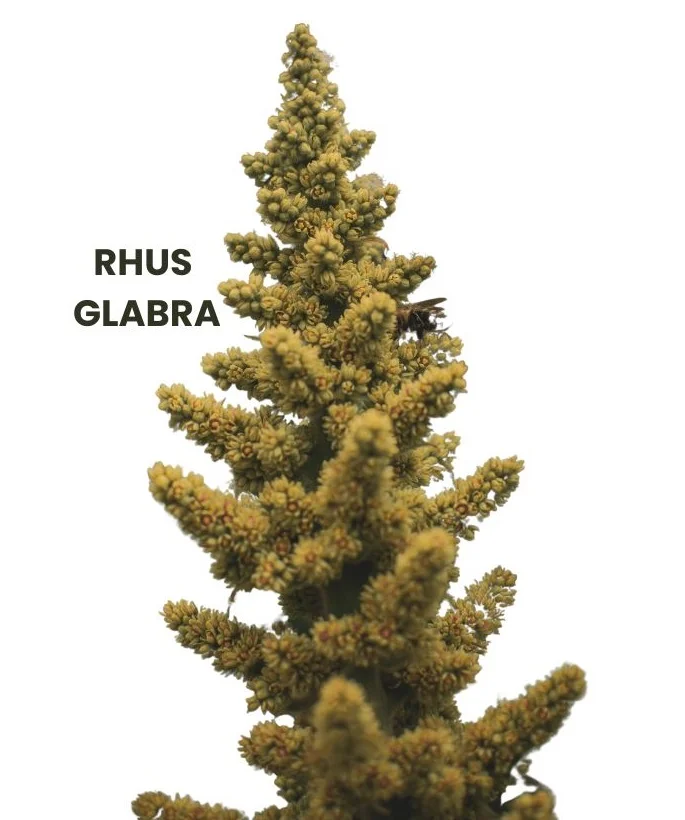Rhus Glabra, commonly known as Smooth Sumach, is a homeopathic remedy primarily used for conditions involving the mouth, gastrointestinal system, and headaches.
It is particularly noted for its disinfectant properties, making it effective in treating ulcerative and putrescent conditions.

Table of Contents
ToggleSOURCE INFORMATION
Scientific Classification
- Kingdom: Plantae
- Clade: Angiosperms
- Clade: Eudicots
- Clade: Rosids
- Order: Sapindales
- Family: Anacardiaceae
- Genus: Rhus
- Species: R. glabra
Origin
- Rhus Glabra is native to North America and is commonly found in open, disturbed areas such as roadsides and fields.
- The plant is recognized by its smooth, non-hairy stems and clusters of bright red berries.
Historical Facts
- Traditionally used by Native Americans for various medicinal purposes, including treating mouth ulcers and digestive issues.
- The berries have been used to make a tart beverage, sometimes referred to as “Indian lemonade.”
DRUG PATHOGENESIS
- Rhus Glabra has a profound effect on the mucous membranes, particularly in the mouth and gastrointestinal tract.
- It is effective in treating ulcerations, fetid flatus, and debility-related perspiration.
- It also addresses conditions like epistaxis (nosebleeds) and occipital headaches.
KEY CHARACTERISTICS
- Disinfectant properties that reduce odour in flatus and stools.
- Effective in putrescent conditions with ulcerative tendencies.
- Profuse perspiration due to debility.
- Dreams of flying.
DETAILED ORGAN SYMPTOMS
MIND
- Dreams of flying: Vivid dreams where the individual feels they are flying through the air, similar to the effect seen in Sticta.
HEAD
- Occipital headache: Pain at the back of the head, often associated with tension and stress.
MOUTH
- Ulceration of mouth: Painful sores and ulcers in the mouth, often linked to conditions like aphthous stomatitis and scurvy.
- Nursing sore mouth: Inflammation and sores in the mouth, particularly in nursing mothers.
GASTROINTESTINAL
- Fetid flatus: Foul-smelling gas that can be significantly reduced with this remedy.
- Putrescent conditions: Effective in conditions where there is decay or rot within the digestive system, leading to bad odours.
PERSPIRATION
- Profuse sweating: Excessive sweating caused by general debility and weakness, similar to the effects seen in China.
MODALITIES
- Worse: With movement, stress, and dietary indiscretions.
- Better: Rest, fresh air, and maintaining oral hygiene.
RELATIONSHIP WITH OTHER DRUGS
- Antidotal to Mercury: Rhus Glabra is said to counteract the effects of mercury poisoning, making it useful in treating secondary syphilis after mercurialization.
- Compare with: Veronica (for nursing sore mouth), Sticta (for dreams of flying), China (for profuse perspiration).
DOSE
- Potency: Typically used in tincture form for local applications to soft, spongy gums, aphthous ulcers, and pharyngitis. Internally, it is used in the first potency.
Frequently Asked Questions (FAQs)
What conditions can Rhus Glabra treat?
- Rhus Glabra is used to treat ulcerative conditions in the mouth, foul-smelling gas, debility-related sweating, epistaxis, and occipital headaches.
How should Rhus Glabra be administered?
- It can be applied locally as a tincture to affected areas in the mouth or taken internally in the first potency, as advised by a homeopathic practitioner.
Are there any side effects associated with Rhus Glabra?
- When used in the recommended potencies and under the guidance of a practitioner, it is generally safe.
- Always consult with a homeopathic practitioner before use.
Can Rhus Glabra be used for children?
- Yes, it can be used for children, particularly for mouth ulcers and digestive issues, but only under the supervision of a homeopathic practitioner.
What should be avoided while taking Rhus Glabra?
- Avoid dietary indiscretions and stress, which can exacerbate symptoms.
Glossary of Difficult Words
- Epistaxis: Nosebleed.
- Putrescent: Undergoing the process of decay; rotting.
- Aphthous stomatitis: A condition characterized by the repeated formation of benign and non-contagious mouth ulcers.
- Mercurialization: The treatment or poisoning resulting from mercury or its compounds.
- Debility: Physical weakness, especially as a result of illness.
This detailed drug picture of Rhus Glabra provides comprehensive information on its uses, effects, and administration, making it a valuable resource for both practitioners and patients.
